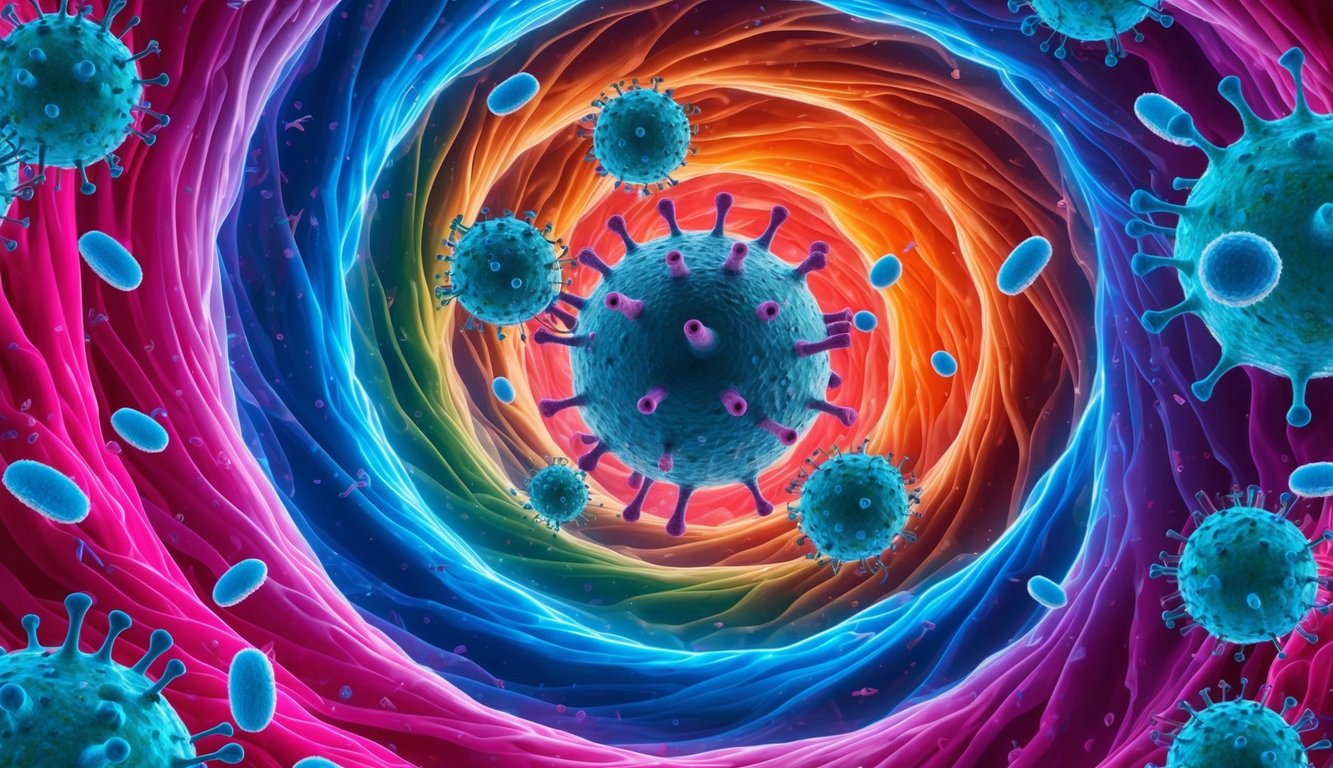Specialized Pro-Resolving Mediators (SPMs) are emerging as powerful allies in the fight against chronic inflammation. These unique compounds, derived from essential fatty acids, play a crucial role in controlling and resolving tissue inflammation. SPMs offer a promising avenue for enhancing the health benefits of a carnivore diet by modulating the inflammatory response and promoting tissue healing.
The carnivore diet, characterized by its focus on animal-based foods, naturally provides a rich source of omega-3 fatty acids. These fatty acids serve as precursors for SPMs, potentially amplifying the diet’s anti-inflammatory effects. By incorporating SPMs into a carnivore eating plan, individuals may experience improved resolution of inflammation and enhanced overall health outcomes.
Research suggests that SPMs have significant potential as novel therapeutics for preventing and managing chronic immune disorders. Their ability to limit acute inflammation and promote a return to homeostasis following infection or injury makes them particularly interesting in the context of a carnivore diet. This combination may offer a powerful approach to addressing inflammatory issues and supporting optimal health.
Understanding Specialized Pro-Resolving Mediators
Specialized Pro-Resolving Mediators (SPMs) are bioactive lipids that play a crucial role in resolving inflammation. These molecules, derived from omega-3 fatty acids, actively promote the resolution of inflammatory processes and help restore tissue homeostasis.
The Role of SPMs in Inflammation Resolution
SPMs actively orchestrate the resolution phase of inflammation. They reduce neutrophil infiltration, enhance macrophage phagocytosis of cellular debris, and promote tissue repair. SPMs also modulate pain signals and support the return to normal tissue function.
These mediators work by activating specific receptors on immune cells, triggering anti-inflammatory and pro-resolving cascades. This process is distinct from simply suppressing inflammation, as SPMs actively promote the clearance of inflammatory stimuli and damaged cells.
SPMs have shown promise in various inflammatory conditions, including respiratory diseases, arthritis, and cardiovascular disorders. Their ability to resolve inflammation without compromising immune function makes them attractive therapeutic targets.
Classes of SPMs: Resolvins, Protectins, and Maresins
SPMs are categorized into three main classes:
- Resolvins: Derived from EPA and DHA, they reduce neutrophil infiltration and cytokine production.
- Protectins: Primarily from DHA, they protect tissues from damage and promote cell survival.
- Maresins: Also from DHA, they enhance macrophage phagocytosis and tissue regeneration.
Each class has unique functions and targets specific aspects of the inflammatory response. Resolvins, for example, are particularly effective in reducing pain and promoting wound healing. Protectins demonstrate neuroprotective properties, while maresins excel in tissue repair and regeneration.
Biosynthesis of SPMs From Essential Fatty Acids
SPMs are synthesized from omega-3 polyunsaturated fatty acids (PUFAs), primarily eicosapentaenoic acid (EPA) and docosahexaenoic acid (DHA). The biosynthesis involves a series of enzymatic reactions:
- Lipoxygenase enzymes initiate the process by oxidizing EPA or DHA.
- Intermediate compounds are formed and further modified by specific enzymes.
- Final SPM molecules are produced through additional enzymatic steps.
This biosynthesis occurs in various cell types, including neutrophils, macrophages, and epithelial cells. The production of SPMs is tightly regulated and can be influenced by dietary intake of omega-3 fatty acids, environmental factors, and overall health status.
Enhancing SPM production through dietary interventions or supplementation may offer a novel approach to managing inflammatory conditions. Research continues to explore the potential of SPMs as therapeutic agents and their role in maintaining optimal health.
The Impact of Diet on SPM Production
Diet plays a crucial role in the production of Specialized Pro-Resolving Mediators (SPMs). The types and amounts of fatty acids consumed directly influence SPM biosynthesis and availability in the body.
Dietary Fatty Acids and SPM Biosynthesis
Essential fatty acids serve as precursors for SPM production. Omega-3 polyunsaturated fatty acids, particularly EPA and DHA, are key substrates for SPM biosynthesis. These fatty acids undergo enzymatic conversion to form various SPMs, including resolvins, protectins, and maresins.
The body’s ability to synthesize SPMs depends on the availability of these precursor fatty acids. Adequate intake of omega-3s is crucial for maintaining optimal SPM levels.
Dietary sources rich in omega-3s include fatty fish, fish oil supplements, and some plant-based options like flaxseeds and chia seeds.
The Carnivore Diet and Omega-3 to Omega-6 Fatty Acid Ratio
The carnivore diet, consisting primarily of animal products, can significantly impact the omega-3 to omega-6 fatty acid ratio. This ratio is important for SPM production and overall inflammatory balance.
Grass-fed meats and wild-caught fish tend to have higher omega-3 content compared to grain-fed alternatives. Consuming these sources can help improve the omega-3 to omega-6 ratio.
A balanced ratio promotes efficient SPM biosynthesis and supports the body’s natural inflammation resolution processes.
Individuals following a carnivore diet should be mindful of their fatty acid intake to ensure adequate precursors for SPM production.
Fish Oil and Plant-Based Sources of Omega-3s
Fish oil supplements are a concentrated source of omega-3 fatty acids, particularly EPA and DHA. These supplements can boost SPM production in individuals following various diets, including the carnivore diet.
High-quality fish oil supplements provide a direct source of SPM precursors, potentially enhancing the body’s ability to resolve inflammation.
Plant-based sources of omega-3s, such as flaxseed oil and algae-derived supplements, offer alternatives for those who prefer non-animal sources. These contain primarily ALA, which the body can convert to EPA and DHA, albeit less efficiently.
Combining fish oil supplements with a carnivore diet may help optimize SPM production and support overall health.
Benefits of SPMs in Managing Chronic Inflammatory Diseases
Specialized pro-resolving mediators (SPMs) show promise in addressing various chronic inflammatory diseases. These bioactive lipids derived from omega-3 fatty acids work to resolve inflammation and restore homeostasis in the body.
Cardiovascular Diseases and SPMs
SPMs play a crucial role in managing cardiovascular diseases. Resolvins, a type of SPM, help reduce atherosclerotic plaque formation by decreasing inflammatory cytokine production. They also promote the clearance of dying cells and debris in blood vessels.
SPMs improve endothelial function, enhancing blood flow and reducing the risk of clot formation. This action is particularly beneficial for patients with hypertension or coronary artery disease.
Research indicates that SPMs may help prevent cardiac fibrosis, a common complication in heart failure patients. By modulating the immune response, SPMs limit excessive scarring and preserve heart muscle function.
SPMs in Autoimmune Conditions and Diabetes
In autoimmune conditions, SPMs help restore immune balance by suppressing excessive inflammation without compromising the body’s ability to fight infections. They promote the differentiation of regulatory T cells, which are crucial for maintaining immune tolerance.
For diabetes patients, SPMs show potential in reducing insulin resistance and improving glucose metabolism. They accomplish this by decreasing pro-inflammatory signals in adipose tissue and enhancing insulin sensitivity in muscle cells.
SPMs also protect pancreatic beta cells from inflammation-induced damage, potentially slowing the progression of type 1 diabetes. In type 2 diabetes, they may help preserve beta cell function and improve insulin secretion.
Potential of SPMs in Treating Metabolic Diseases
SPMs demonstrate significant potential in addressing metabolic diseases. They promote the browning of white adipose tissue, increasing energy expenditure and potentially aiding in weight management.
In non-alcoholic fatty liver disease (NAFLD), SPMs reduce hepatic inflammation and lipid accumulation. This action helps prevent the progression to more severe forms of liver disease.
SPMs also improve metabolic flexibility, enhancing the body’s ability to switch between fat and carbohydrate oxidation. This effect can be particularly beneficial for individuals with metabolic syndrome or obesity.
Recent studies suggest that SPMs may help regulate appetite and food intake by modulating hypothalamic inflammation. This could offer new avenues for treating obesity and related metabolic disorders.
Immune Response and The Role of SPMs
Specialized pro-resolving mediators (SPMs) play a crucial role in modulating immune responses. These lipid-derived molecules actively regulate inflammation and promote resolution.
SPMs and White Blood Cell Activation
SPMs interact with various white blood cells to orchestrate immune responses. They enhance the activity of macrophages, key players in innate immunity. SPMs stimulate macrophage phagocytosis, improving their ability to engulf pathogens and cellular debris.
These mediators also influence neutrophil behavior. SPMs limit neutrophil infiltration into inflamed tissues, preventing excessive damage. Additionally, they promote the clearance of apoptotic neutrophils, supporting the resolution of inflammation.
SPMs modulate lymphocyte function as well. They influence B-cell responses, affecting antibody production and immune memory formation. T-cell activity is also regulated by SPMs, impacting both pro-inflammatory and regulatory T-cell subsets.
Phagocytosis and Efferocytosis Mediated by SPMs
SPMs enhance phagocytosis, the process by which immune cells engulf and eliminate pathogens or cellular debris. This increased efficiency helps clear infection sites more rapidly.
Efferocytosis, the removal of apoptotic cells, is another critical process mediated by SPMs. By promoting efferocytosis, SPMs prevent secondary necrosis and reduce tissue damage.
These mediators stimulate macrophages to switch from a pro-inflammatory to a pro-resolving phenotype. This phenotypic shift is crucial for initiating the resolution phase of inflammation.
SPMs also enhance the non-phlogistic (non-inflammatory) nature of phagocytosis. This allows for efficient clearance of pathogens and debris without triggering further inflammatory responses.
Regulation of Inflammatory Cytokines and Chemokines
SPMs play a vital role in modulating the production and activity of inflammatory mediators. They reduce the synthesis of pro-inflammatory cytokines such as TNF-α, IL-1β, and IL-6.
Simultaneously, SPMs promote the production of anti-inflammatory cytokines like IL-10. This shift in the cytokine profile helps dampen excessive inflammation and restore tissue homeostasis.
Chemokine regulation is another important function of SPMs. They decrease the production of certain chemokines, limiting further recruitment of inflammatory cells to affected areas.
SPMs also modulate the expression of adhesion molecules on endothelial cells. This regulation impacts leukocyte trafficking and helps control the inflammatory response.
Therapeutic Potential of SPMs in Clinical Contexts

Specialized pro-resolving mediators (SPMs) show promise for treating various inflammatory conditions. These bioactive compounds offer unique therapeutic benefits compared to traditional anti-inflammatory drugs.
Anti-Inflammatory Drugs Versus SPMs
Traditional anti-inflammatory drugs often have side effects and fail to promote active resolution of inflammation. SPMs, on the other hand, work by stimulating the body’s natural resolution processes.
SPMs like resolvins and protectins actively reduce neutrophil infiltration and enhance macrophage-mediated clearance of cellular debris. This dual action helps resolve inflammation without suppressing immune function.
Clinical trials have shown SPMs to be effective for conditions like periodontal disease and dry eye. They demonstrate a better safety profile than NSAIDs or corticosteroids.
SPMs in Tissue Repair and Cancer
SPMs play a crucial role in tissue repair and regeneration after injury or infection. They promote wound healing by reducing excessive inflammation and supporting tissue remodeling.
In cancer, SPMs show potential for enhancing the effectiveness of existing therapies. They may help reduce tumor-promoting inflammation while boosting anti-tumor immune responses.
Some studies indicate SPMs could inhibit cancer cell growth and metastasis. However, more research is needed to fully understand their effects in different cancer types.
Advances in SPM Supplementation and Biomarkers
Dietary supplements containing SPM precursors like fish oil are widely available. However, direct SPM supplementation is an emerging area of research.
Omaprem, a synthetic SPM, has shown promise in clinical trials for reducing inflammation in cardiovascular disease.
Researchers are developing new biomarkers to measure SPM levels in patients. These tools could help personalize SPM-based therapies and monitor treatment effectiveness.
Advances in SPM production methods are making it easier to study their effects in larger clinical trials. This may lead to new therapeutic applications in the coming years.
Conclusion

Specialized Pro-Resolving Mediators (SPMs) offer promising potential for enhancing the health benefits of a carnivore diet. These bioactive compounds play a crucial role in resolving inflammation and promoting tissue repair.
By incorporating SPM-rich foods or supplements, carnivore dieters may experience improved inflammatory responses. This could lead to better overall health outcomes, particularly for those dealing with chronic inflammation.
The anti-inflammatory properties of SPMs complement the already low inflammatory nature of a well-formulated carnivore diet. This synergy may provide enhanced protection against various inflammatory conditions.
Research suggests that SPMs can support the body’s natural resolution of inflammation processes. This is particularly relevant for individuals following a carnivore diet, as it may help optimize their health outcomes.
Further studies are needed to fully understand the long-term effects of combining SPMs with a carnivore diet. However, current evidence points to potential benefits in managing chronic inflammation and supporting overall health.
